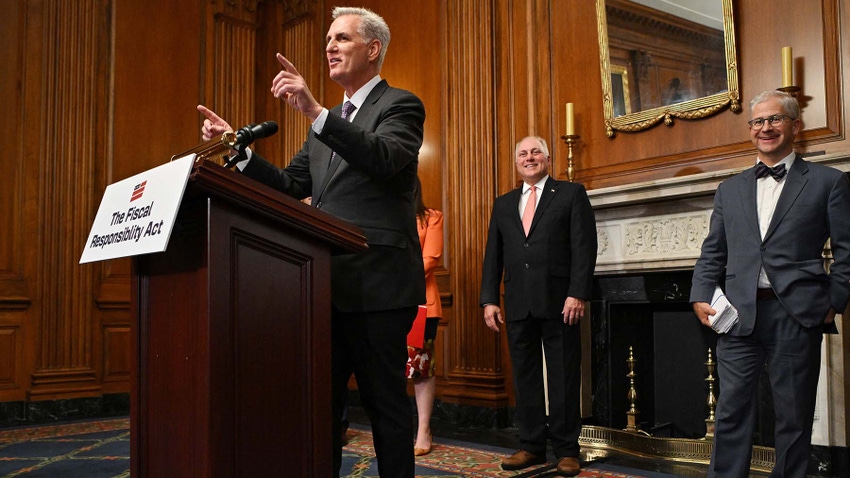
A bipartisan coalition of 165 Democrats and 149 Republicans in the House of Representatives voted to suspend the nation’s debt ceiling until Jan. 2025. The bill passed by a margin of 314 to 117, with four lawmakers not casting a vote.
It now goes to the upper chamber, where Senators will be under pressure to pass the legislation before June 5. Treasury Secretary Janet Yellen has warned that if the debt ceiling is not raised by that day, the federal government could begin defaulting on its financial obligations.
“I have been clear that the only path forward is a bipartisan compromise that can earn the support of both parties,” President Joe Biden said in a public statement shortly after the vote. “This agreement meets that test. I urge the Senate to pass it as quickly as possible so that I can sign it into law, and our country can continue building the strongest economy in the world.”
Under the terms of the deal negotiated by Biden and House Speaker Kevin McCarthy, the current government spending limit of $31.4 trillion would be suspended, allowing the government to continue paying its obligations. On January 1, 2025, the limit would then be increased to accommodate additional obligations issued during the suspension period.
The bill, which Republicans dubbed The Financial Responsibility Act, includes additional non-military spending cuts in 2024 and 2025, and additional work requirements for SNAP and TANF recipients. It provides funding to the Veterans Affairs Cost of War Toxic Exposure fund while reducing the amount of money allocated to pandemic relief programs and Internal Revenue Service enforcement efforts. It also cancels Biden’s student loan forgiveness program while green-lighting the 300-mile Mountain Valley pipeline and other energy infrastructure projects.
House Agriculture Committee Chair GT Thompson, who voted in favor of the bill, says it is about time Washington took steps to get the country’s fiscal house in order.
"Democrats have over-taxed, over-spent, and overregulated for years, further plunging the nation into a staggering debt and inflation crisis,” Thompson says. “The Fiscal Responsibility Act is a sensible proposal to begin to regain control of the American economy by simplifying and streamlining onerous permitting processes, limiting costly and excessive regulatory actions, and expanding access to employment and training for those in need.”
While Thompson praised the bill, 71 of his fellow Republicans voted against it. They contend the spending cuts do not go far enough. Ag Committee members voting against the measure included Mark Alford, R- Mo., Mike Bost, R-Ill., Kat Cammack, R- Fla., Scott DesJarlais, R- Tenn., Brad Finstad, R- Minn., Ronny Jackson, R- Texas, Tracey Mann, R- Kan., Mary Miller, R- Tenn., Barry Moore, R- Ala., and John Rose, R- Tenn.
On the Democratic side, 46 representatives voted against the bill including ag committee members Greg Casar, D- Texas, Jasmine Crockett, D- Texas, Jahana Hayes, D- Conn. and Jim McGovern, D- Mass.
Rep. Crockett calls the new SNAP requirement “punitive, ineffective and needlessly cruel.” She says Speaker McCarthy has allowed the extremist, anti-governing wing of his party to use the debt ceiling to hold the American Economy hostage. While acknowledging the consequences of default, she says she could not vote for a bill that directly harms her constituents.
“As the representative of a district with a rate of poverty and food insecurity higher than the national average because of historic underinvestment and systemic racism, these cuts would fall squarely on the shoulders of my most vulnerable constituents,” Crockett says. “Additionally, the claw backs of COVID-19 recovery funds would rob schools and hospitals in my district of hundreds of thousands of dollars in federal reimbursement they were promised to cover the higher costs of safety improvements and worker salaries during the pandemic.”
Instead of cutting social programs, Crockett believes the best way to reduce the deficit would be to raise taxes of the richest Americans and corporations. According to her, this would lower the national deficit by $2 trillion more than the debt ceiling bill.
Before the final vote, she attempted to add five amendments that would have eased the impact of the new SNAP rules, delayed the resumption of student loan payments and authorized an IRS report on the impact of tax fraud. All her amendments were voted down.
Read more about:
LegislationAbout the Author(s)
You May Also Like






